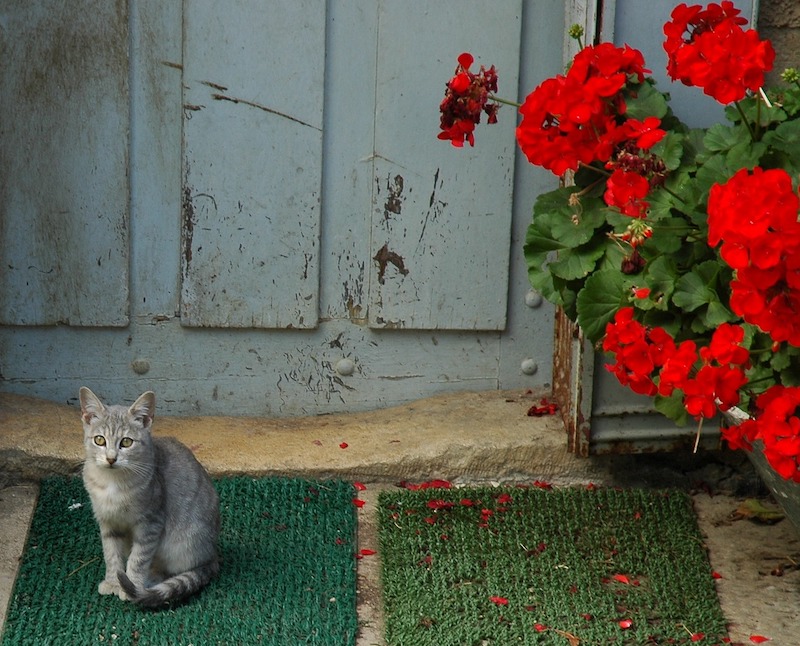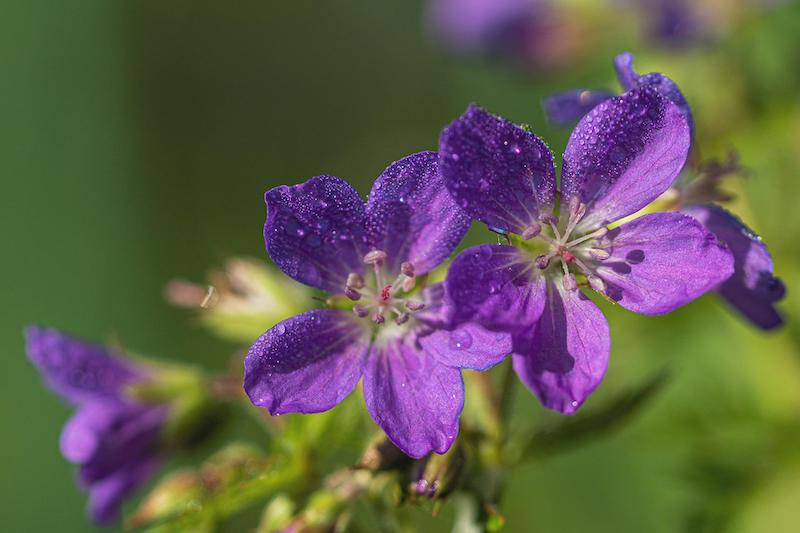Annual geraniums, which mainly come from South Africa and are sensitive to frost, are mildly poisonous to pets, including dogs, cats, rabbits, and horses. These plants are known as pelargoniums and contain small amounts of the toxic compounds geraniol and linalool. These substances are not toxic to humans, and in fact, scented geraniums have been used in cakes, jams, and teas for centuries. The leaves contain essential oils that are popular for use in aromatherapy, shampoos, soaps, and insect repellants.
Perennial geraniums are members of the Geranium genus and are not toxic to people or pets. These plants are commonly known as hardy cranesbill and are resistant to frost. Hardy cranesbills have been used as natural remedies for treating dysentery, mouth ulcers, and sore throat. The leaves can be rubbed on insect bites or used as a mosquito repellent.
Are Geraniums Poisonous to Children?
No part of annual or perennial geraniums are toxic to children. This includes the flowers, leaves, stems and roots. The essential oils in pelargoniums can cause mild skin irritation, called allergic contact dermatitis, in some people. When the essential oil is applied to the skin, some people may notice a rash or burning sensation.

Are Geraniums Poisonous to Dogs?
Pelargoniums are toxic to dogs. Low levels of geraniol and linalool are found in all parts of pelargonium plants and are responsible for the toxicity. Geraniol is an acyclic monoterpene alcohol that can cause skin and eye irritation in dogs. Linalool is a terpene alcohol that is metabolized in the dog’s liver and can cause allergic reactions and liver damage.
Most dogs will avoid this plant, but puppies are particularly at risk because of their small size and inquisitive nature. Signs of geranium intoxication include vomiting, loss of appetite, lethargy, dermatitis and depression. If you suspect your dog has geranium poisoning, call your veterinarian or the ASPCA Animal Poison Control Hotline (888-426-4435).
Hardy cranesbills are non-toxic and can be grown in gardens accessed regularly by dogs.
Are Geraniums Poisonous to Cats?
Cats are particularly sensitive to ingestion of pelargoniums. All parts of the plant are poisonous to cats because of the presence of geraniol and linalool. Cats usually tend to avoid pelargoniums because of the pungent smell. However, if you notice your cat munching on your annual geranium leaves, be sure to contact your veterinarian for guidance. Signs of geranium intoxication in cats include vomiting, diarrhea, depression and anorexia.

If you are growing hardy geraniums, you don’t need to worry about cats eating them as they are nontoxic.
Are Geraniums Poisonous to Other Animals?
Pelargoniums are toxic to rabbits, horses and other herbivores. Rabbits tend to avoid these plants because of their fragrant, thick leaves, but they may nibble at them if they are very hungry. Even a little nibbling, however, is unlikely to cause severe symptoms in rabbits. Horses also do not commonly snack on geraniums unless they are hungry or bored. A horse would need to eat a large amount of your geraniums to experience any side effects.
Ingestion of hardy geraniums does not cause problems for rabbits, horses and other herbivores.
Symptoms Of Geranium Poisoning
Always check with your veterinarian if you suspect pelargonium poisoning, or call the ASPCA Animal Poison Control Hotline (888-426-4435).
Here are some common symptoms to look out for:
- Vomiting
- Diarrhea
- Depression
- Lethargy
- Loss of appetite
- Dermatitis
Preventing Geranium Poisoning
To prevent poisoning from pelargoniums, keep plants out of your pet’s reach. If you are growing pelargoniums in containers, place the container on a surface the pet can’t access, or add a barrier around the container. If you are growing the plant in the ground, put it outside the pet’s fenced area or add a cage around the plant for protection. Provide pet cats and rabbits with safer plants to nibble, such as wheat, oat, or rye grass. If you are not able to keep your pet away from your pelargonium plant, consider replacing it with a non-toxic selection.
Hardy cranesbills are not toxic to pets and can be planted in the front of a perennial border with no concern for pet toxicity. They are tough plants and will withstand some trampling from children, dogs, and cats.
Pet Poison Helpline
If something were to happen to your furry friend, and you suspect that they are suffering from geranium poisoning, call the Pet Poison Hotline at (855) 764-7661 for 24/7 advice.
Click here for a complete list of Pet Safe Plants.
Sources:
"Geranium." American Society for the Prevention of Cruelty to Animals. aspca.org
"Pelargonium." North Carolina Extension Gardener Plant Toolbox. plants.ces.ncsu.edu/plants
 |
Author Jessica Mercer - Published 7-04-2022 |



